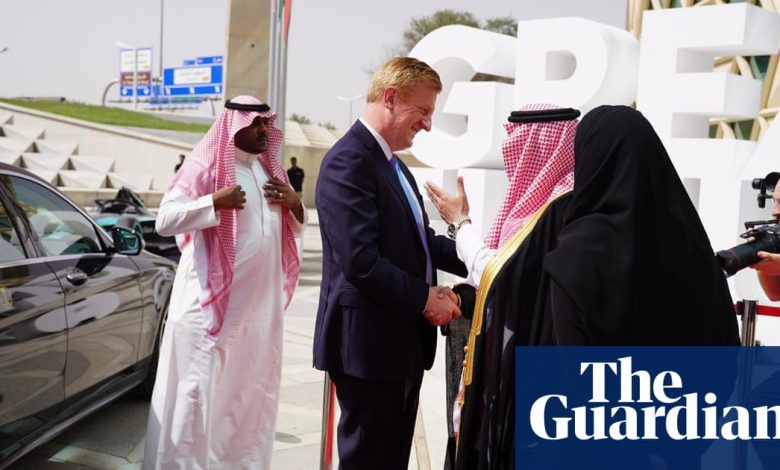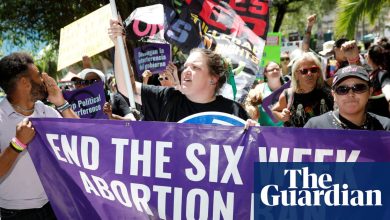‘Art-washing’? Unease as British cultural institutions lend lustre to Saudi trade push | Trade policy

[ad_1]
It was an unusual gig for YolanDa Brown, the saxophonist and composer who this week performed high above the clouds for a UK delegation on a private British Airways jet bound for Saudi Arabia.
The flight was part of a commercial offensive for British firms and institutions in Riyadh, with Brown’s presentation part of a new focus for Saudi-UK relations – international arts.
The two-day Great Futures conference in the Saudi capital attracted 450 British business leaders and politicians to its panels, dinners and meetings. The delegation featured a significant contingent of cultural organisations, a move that immediately sparked criticism that the Gulf state was “artwashing” – using Britain’s venerable institutions to boost its international image, despite concerns over human rights compliance in Riyadh continues to grow.
“British businesses have a responsibility to reduce the risk of contributing to human rights abuses, which includes the risk of reputational laundering,” said Joey Shay, Saudi Arabia-focused researcher at Human Rights Watch.
For Britain’s smart business elite, the reminder not to wear ‘tight’ clothes or clothes bearing ‘foul slogans’ may not have been entirely necessary. But as representatives of the UK government funded Great trade campaign sent delegates, the “cultural guidelines” (which also contained advice on local laws and alcohol consumption) served as a reminder of the problematic background of the Middle Eastern charm offensive.
#FANTASTICFUTURES Riyadh is expected to secure a constellation of investments in various sectors: from financial services to higher education. This is the start of a year-long campaign to highlight the UK’s expertise and capacity in sectors that support Saudi Arabia #Vision2030 🇸🇦🇬🇧 pic.twitter.com/A7gLBrO3yC
— Campaign for GREAT BRITAIN and Northern Ireland (@GREATBritain) May 15, 2024
The Big Campaign was set up in 2011 to boost trade and tourism and in 2021 received £60m of funding, designed to complement the drive for new trade deals after Brexit. The result is £4.5 billion in exports and investment over 13 years, its supporters claim.
Britain’s trade relationship with Saudi Arabia is well established, from the delivery of Lightning and Strikemaster aircraft in the 1960s to 1985 Al-Yamamah arms-for-oil deal, which was implicated in corruption allegations. Now the connection is expanding into industries ranging from technology to high profile sporting events. Saudi Arabia exports worth £13.1bn to UK in 2023
As oil money continues to flow out of Saudi Arabia’s $700 billion public investment fund, British ministers and businesses are scrambling to get a piece of the action as the crown prince’s regime, Mohammed bin Salmanspends money on ambitious infrastructure projects, including a desert ski resort and (reduced) project to build a 105-mile-long “landscaper” city called the Line.
The British establishment is throwing itself into the relationship. The UK’s ambassador to Riyadh, Neil Compton, spoke of the “transformational change” he had witnessed in the mail in a letter to visiting delegates. On stage, Britain’s investment secretary, peer Dominic Johnson, said he had been “grabbing people by the lapels” to protect Saudi Arabia since his first trip. There were also industry-specific evenings, including one hosted at the UNESCO heritage site of Ad-Dir’iyah.
Beneath this grandeur lies a hum of international concern about the kingdom’s human rights record, from death penalty of the fact that homosexuality remains a criminal offence.
Downing Street said Deputy Prime Minister Oliver Dowden had raised allegations that Saudi forces had been “told to kill” following claims about a man who protested the eviction to make way for the line being shot and killed. Foreign Secretary David Cameron recently said UK opposes ‘execution of children’ following concerns about apparent abuses in Saudi Arabia.
Speakers at the conference represented a mix of interests ranging from sports to the construction and automotive industries. Designer Thomas Heatherwick, ex-footballer Rio Ferdinand and a clutch of Tori figures including former party co-chairman Ben Elliott appeared.
The head coach of Newcastle United’s Saudi-backed women’s football team was in attendance, as was club director Amanda Staveley. The FTSE titans were notably absent, with only HSBC and British Airways present.
But perhaps most notable were the British cultural institutions that had made the trip: the Southbank Centre, an organisation candid about his desperate need for fresh funds; The National Theatre; and the Royal Opera House.
Under Saudi Arabia’s Vision 2030 strategy, 11 special cultural commissions, including one for theater and performing arts, are being established to build partnerships with existing professionals in each field. in her speechculture secretary Lucy Fraser praised the funding opportunities for films, new recording studios and the hosting of major concerts and festivals.
In the museum sector, the Louvre Abu Dhabi branch provided a blueprint for Western museums opening sites in the Middle East, while last year the Science Museum Group signed an agreement with Saudi Arabia to create a “museum hub” – sharing knowledge between international researchers – in Riyadh.
“This show will generate hundreds of millions, if not billions, for the UK,” said Jonathan Shalit, the celebrity agent who managed singer Charlotte Church.
after the promotion of the newsletter
Shalit, whose InterTalent Group counts singers Pixie Lott and Lulu as clients, chairs a panel including the head of Virgin Music UK and says the kingdom’s young population (60% of Saudis are under 30) offers a “huge opportunity” for the creative industries . Famous Western artists are increasingly performing in the region; last year’s Soundstorm Desert Festival featured Bruno Mars, David Guetta and Metallica.
But not everyone is convinced. “The government of Saudi Arabia is using its near-limitless means to host high-profile events with celebrities, athletes, and now artists and cultural institutions to whitewash its poor human rights record and deflect efforts to hold it accountable. your guide to terrible abuses,” Shay said. “Artists and cultural institutions must speak openly about the grave abuses in the country or risk becoming complicit in them.”
Fraser was forced to refute claims by human rights activists that the institutions provide “legitimacy” to the Saudi state.
James Lynch, co-founder of workers’ rights group FairSquare, told Middle East Eye: “There are serious questions for these cultural leaders, not least whether seeking to partner with the Saudi crown prince’s megaprojects is really in line with the values their institutions profess. that they encourage , or whether they engage in a high-level art-washing exercise.’
The Kingdom has already been accused of sporting laundering, with huge sums spent on acquiring and hosting a major event, the takeover of Newcastle United and a successful bid for World Cup 2034.
For their part, UK cultural institutions have argued that their presence can help push for societal change.
“Many in the creative industries are not yet ready to accept Saudi Arabia,” Shalit said. “Many people in the LGBTQ+ community would not feel comfortable coming to Saudi Arabia. I understand that. If you’re a touring theater company relying on persuading a company of 200 performers to come to Saudi Arabia, that could be a problem.”
But, he said, last year’s first on-stage kiss in Saudi Arabia — between a man and a woman in “The Phantom of the Opera” — was a momentous moment. “I would say to people who don’t want to visit Saudi Arabia: you don’t change the narrative by not engaging. I feel they are happy to have the conversation – change is underway.”
Saudi Arabia’s young demographic may also hold the key to another fruitful sector – that of education.
“This country is developing,” said Karan Bilimoria, a former president of the CBI who is chancellor of the University of Birmingham, which has 500 Saudi students. “It goes both ways – students come to the UK and schools and universities expand here.” The University of Strathclyde will open in the kingdom this year, with an aim to educate women in fields such as engineering and business. For struggling British universitiesstudents with deep pockets and lucrative overseas connections seem attractive.
But what about Saudi fossil fuels impact on the climate crisis? “I don’t want to talk about it,” Bilimoria said. “I am here with a positive attitude to build relations between our countries.”
[ad_2]




